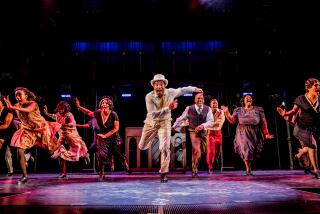JAZZ REVIEWS : Mundell Lowe Takes the High Road at Maxwell’s by Sea
- Share via
HUNTINGTON BEACH — Class was the name of the game when guitarist Mundell Lowe opened a two-night engagement Friday at Maxwell’s by the Sea.
The veteran musician, whose career includes performances with Charlie Parker and Benny Goodman and who has composed the soundtracks to such films as Woody Allen’s “Everything You Always Wanted to Know About Sex, but Were Afraid to Ask,” is a be-bop bent stylist who embraces musical statement built around beauty.
With the Jim De Julio Trio--bassist De Julio, pianist Paul Smith and drummer Jimmy Dee--Lowe, 70, sat on a low-back stool and crafted one fluid, rhythmically solid, mellifluous line after another, stringing these strands of aural thought into long chains of engaging sound.
Lowe mainly executed his ideas with a clear, precise sound that one associates with such masters as Jim Hall or Jimmy Raney--the latter a major influence on Lowe. If there is a trademark traditional modern jazz guitar sound, Lowe possesses and employs it.
But Lowe, who was born in Laurel, Miss., was early in his life attracted to country music, and the twang that one hears in the tones of such greats as Chet Atkins occasionally emerges in Lowe’s jazz lines. He also made occasional use of a phaser, which by repeating whatever notes Lowe played and then delaying them a millisecond, made it seem as if he had split his sound in two.
Lowe’s vehicles were chosen from the great American pop songbook. The audience, half attentive, half chatty, was treated to such evergreens as Johnny Green’s “Body and Soul,” Duke Ellington’s “Just Squeeze Me” and Harry Warren and Mack Gordon’s “The More I See You.”
Lowe, without any warm-up, swung right from the first notes of the opener, Ray Noble’s “The Touch of Your Lips.” He invested the melody reading with a rhythmic swagger that continued throughout the performance, and in his solo, he revealed his winsome improvisational style.
He concocted lines that went from the low range of his open- bodied instrument to its higher sonic plateau, and then back down, like a kite rising and falling. He executed statements of a few well-selected notes, then paused and offered more notes that seemed to mirror what he had just played--they were of a similar melodic shape, but were opposites in form and direction. He concluded his two-chorus effort with a series of chords that moved smoothly along, creating color wherever they went. After tasteful solos by Smith and De Julio, who were in their usual fine fettle, Lowe played a chorus with his phaser one, sounding like a be-bop Pat Metheny.
“The More I See You” was chock-full of little delights. Lowe’s solo began with the tune’s melody, then he moved away from it, interjecting blues phrases, a country-ish idea or two and accented notes that jumped out at a listener like a light bulb suddenly turned on in a dark room.
“Body and Soul” was an opportunity for Lowe to offer more chord melody, using the shifting chunks of sound to create tonal clusters that oozed color. Charlie Parker’s “Steeplechase,” an exercise in that favorite jazzmen’s realm--the chord structure of George Gershwin’s “I Got Rhythm”--allowed Lowe to express himself deftly in the be-bop mode.
If Lowe can be faulted for anything in this performance, it was that he simply didn’t play enough. And while one found pleasure in hearing the extensive solos of Smith and De Julio, two or three choruses per tune from the infrequently appearing and immensely enjoyable Mundell Lowe left one wanting.
More to Read
The biggest entertainment stories
Get our big stories about Hollywood, film, television, music, arts, culture and more right in your inbox as soon as they publish.
You may occasionally receive promotional content from the Los Angeles Times.










